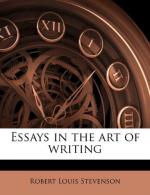There is plenty to do, plenty to say, or to say over again, in the meantime. Any literary work which conveys faithful facts or pleasing impressions is a service to the public. It is even a service to be thankfully proud of having rendered. The slightest novels are a blessing to those in distress, not chloroform itself a greater. Our fine old sea-captain’s life was justified when Carlyle soothed his mind with The King’s Own or Newton Forster. To please is to serve; and so far from its being difficult to instruct while you amuse, it is difficult to do the one thoroughly without the other. Some part of the writer or his life will crop out in even a vapid book; and to read a novel that was conceived with any force is to multiply experience and to exercise the sympathies.
Every article, every piece of verse, every essay, every entre-filet, is destined to pass, however swiftly, through the minds of some portion of the public, and to colour, however transiently, their thoughts. When any subject falls to be discussed, some scribbler on a paper has the invaluable opportunity of beginning its discussion in a dignified and human spirit; and if there were enough who did so in our public press, neither the public nor the Parliament would find it in their minds to drop to meaner thoughts. The writer has the chance to stumble, by the way, on something pleasing, something interesting, something encouraging, were it only to a single reader. He will be unfortunate, indeed, if he suit no one. He has the chance, besides, to stumble on something that a dull person shall be able to comprehend; and for a dull person to have read anything and, for that once, comprehended it, makes a marking epoch in his education.




